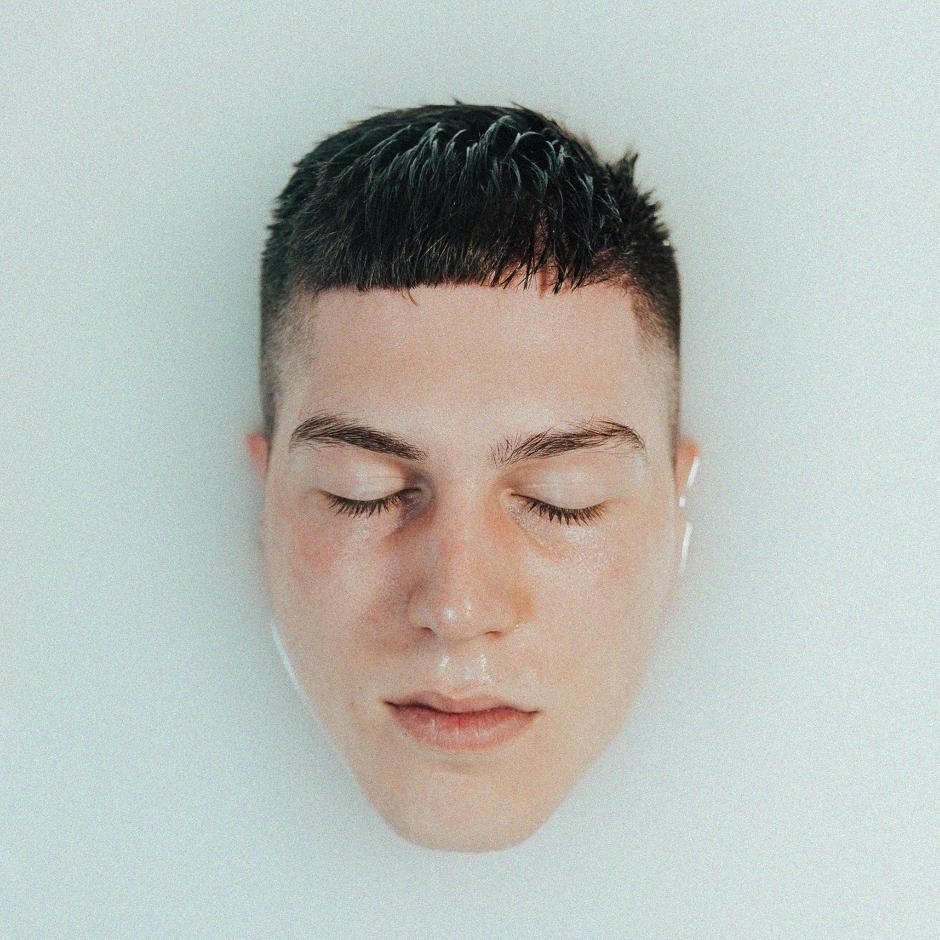Let’s be clear: you want your analysis of a writer’s alliteration to SPARKLE! Okay, so it’s fair to say that a writer often uses the technique to draw our attention to key words or to give them extra oomph – and it’s useful to recognise the ways in which alliteration is commonly employed. Make sure, though, that you consider how each alliterative sound really supports the mood inherent in the particular quote you’re analysing.
Let’s look at some of the alliteration used by our favourite artists in some of our favourite songs. Here’s the playlist!
You go first!
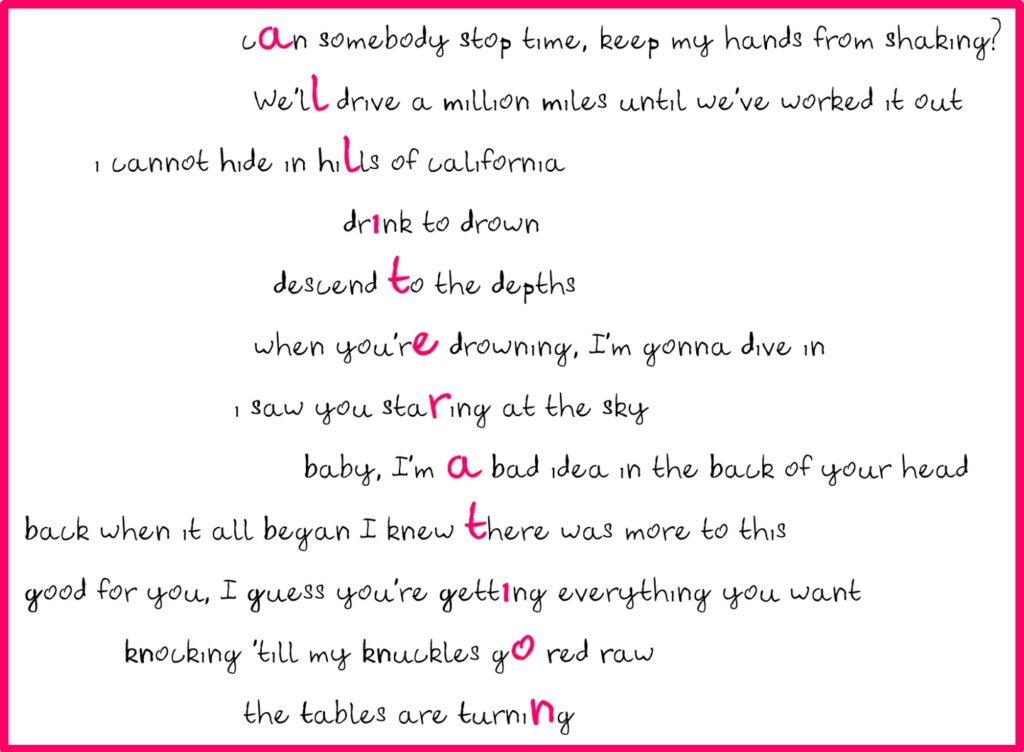
TASK 1
Look at the letters highlighted just below in purple. Try voicing the noise (yes, say it out loud!) that’s created when you repeat that sound over and over. What does the noise remind you of? Where, or in which kind of situation, might you usually hear that kind of sound? What might a person be feeling when they make that sound? Use your ideas to help you draw some interesting conclusions about what effect our featured artists might be trying to create?
You can definitely look at each lyric in its own right and still do a good job of analysing the use of alliteration. But if you want to dig as deep as possible, consider the whole song. What’s it about? If you can answer that question, it will really help you to pinpoint the specific impact of the alliteration used.
Aim to write down any thoughts you have about the alliteration used in each quote. Leave yourself space so you can come back and add further thoughts later. If you’re working on your computer, that’s easy to do. If you’re working on A4, perhaps allow yourself half a side for each quote.
- can somebody stop time, keep my hands from shaking? (ATC)
- We’ll drive a million miles until we’ve worked it out (YONAKA)
- i cannot hide in hills of california (MGK & YUNGBLUD)
- drink to drown (Stand Atlantic)
- descend to the depths (Our Hollow, Our Home)
- when you’re drowning, I’m gonna dive in (YONAKA)
- i saw you staring at the sky (John Floreani)
- baby, I’m a bad idea in the back of your head (Lil Lotus & Chrissy Costanza)
- back when it all began I knew there was more to this (Holding Absence)
- good for you, I guess you’re getting everything you want (Olivia Rodrigo)
- knocking ’till my knuckles go red raw (Holding Absence)
- the tables are turning (FEVER 333)
TASK 2
Okay, maybe you came up with loads of ideas, but maybe you came up with none. If you find yourself in the latter camp, don’t worry at all. It doesn’t matter. By just thinking about the fact that these alliterative sounds have been chosen for a very specific reason, you’re moving in the direction of the kind of analysis that’s going to score BIG.
Now, pause and read through what we made of the alliteration used in the first two songs on the list. The ideas might not match with yours – but that’s fine. As long as you can explain the rationale behind your own thinking and balance out the abstract with some sense of logic, you’ll be doing fine.
- can somebody stop time, keep my hands from shaking? (ATC)
Against The Current’s use of alliteration is sooooooo exciting!! You’ll all understand the softness of that ‘s’ sound but why does singer Chrissy Costanza need to speak so softly? Well, the song is clearly narrating some sort of fight she’s having with her mental health. The ‘s’ sound underlines her efforts to be quiet. She wants to escape the problems she’s facing. But what really gets our heart racing is the realisation that, of course, when it comes to mental health challenges, it doesn’t matter at what volume you’re speaking/thinking. Ultimately, then, that alliteration (specifically speaking, that sibilance) helps us to understand how scared Costanza is. Scared because she needs to somehow slip through this moment unnoticed – and scared because it’s just not possible. The ‘s’ sounds reflect how hard she’s trying to be quiet and yet she still can’t escape her own mind. Pretty frightening stuff.
2. We’ll drive a million miles until we’ve worked it out (YONAKA)
YONAKA are brilliant – and the alliteration here perfectly suits the intention of this, their softest song. We all know when someone’s enjoying a piece of cake. They make that ‘mmmmm’ sound. Their feelings of satisfaction and enjoyment are absolutely clear. The same is true here. YONAKA aren’t trying to fix their friend’s problems in five minutes. They’re up for working on whatever issues need to be worked on for as long as it takes. The alliterative ‘m’ sound adds such a sense of comfort. YONAKA are going to enjoy taking this journey of recovery with their friend. The friend will be reassured by that ‘mmmmm’ sound exactly because YONAKA aren’t acting out of duty or pity. The ‘m’ sound also serves to make the friend feel positive about the future. The fact that YONAKA are already imagining this as a satisfying trip to take surely suggests they believe things are going to work out fine.
TASK 3
Now, have another look at the remaining 10 lyrics. Have the ideas we’ve come up with above inspired you to think in new ways about the rest of the quotes? Take some time to see if you can push a little further into each example of alliteration.
can somebody stop time, keep my hands from shaking? (ATC)We’ll drive a million miles until we’ve worked it out (YONAKA)- i cannot hide in hills of california (MGK & YUNGBLUD)
- drink to drown (Stand Atlantic)
- descend to the depths (Our Hollow, Our Home)
- when you’re drowning, I’m gonna dive in (YONAKA)
- i saw you staring at the sky (John Floreani)
- baby, I’m a bad idea in the back of your head (Lil Lotus & Chrissy Costanza)
- back when it all began I knew there was more to this (Holding Absence)
- good for you, I guess you’re getting everything you want (Olivia Rodrigo)
- knocking ’till my knuckles go red raw (Holding Absence)
- the tables are turning (FEVER 333)
TASK 4
Okay, now have a read through the other ideas we came up with. Use them to inspire your alliterative work when looking at your core texts. It doesn’t matter that Shakespeare, for example, was writing hundred of years ago. A ‘d’ still sounded like it could do some serious damage if it fell on your head and a ‘g’ noise in the 1600s sounded as resolutely raw and animalistic as it does today.
3. i cannot hide in hills of california (MGK & YUNGBLUD)
If you’ve tried singing along to ‘I Think I’m OKAY’ when YUNGBLUD performs it live, you’ll know how breathless it can leave you. And so you’ll also be very familiar with that ‘h’ sound. It’s the noise you make when you’re gasping for air. So, here. the ‘h’ represents how hard Machine Gun Kelly has been trying to get away from the things he’s trying to get away from. The feeling of exhaustion is apparent. Again this could be because MGK is trying to escape himself – Chrissy Costanza and Against The Current know a thing or two about that feeling. Once more, then, you might want to focus on breathlessness as suggestive of fear. California is typically known as the land of dreams. The fact that, even in The Golden State, MGK is still having to run as fast as he can to keep away from his problems makes those problems seem even more terrifying.
4. drink to drown (Stand Atlantic)
That heavy ‘d’ sound is everywhere. All of the characters you’ll meet in your course texts have problems – and those problems are frequently articulated using ‘p’ words and ‘b’ words and ‘d’ words. This is plosive alliteration and it means what it sounds like it means: life is exploding and debris is flying. In this case, we can absolutely hear Stand Atlantic being crushed by their situation. That plosive ‘d’ signifies the weight of the challenges that Stand Atlantic can’t imagine surviving, let alone escaping. The effect of that ‘d’ is doubly effective because it also symbolises the force of the weapon they choose to protect themselves with. Unfortunately, the alcohol they use as some kind of crutch only makes things worse. The doubled-up ‘d’ reflects the multiplying problems. Once again, the writer’s use of alliteration helps us to understand how frightening the situation is.
5. descend to the depths (Our Hollow, Our Home)
We’ve already explored that ‘d’ sound but it’s worth seeing how the same ideas can be relevant in so many different contexts. Once again, that heavy consonant sound reflects the intense pressure Our Hollow, Our Home are experiencing. Each and every ‘d’ sounds like a heavy blow or, perhaps, a door being slammed – both images feel relevant. The problems in singer Connor Hallisey’s life are physically restricting him from living the way he wants to. He is struggling to see a way out. Like Stand Atlantic, he becomes dependent on substances that – rather than relieving the strain – bring their own extra heaviness to the situation. That ‘d’ sound represents the weight upon weight.
6. when you’re drowning, I’m gonna dive in (YONAKA)
YONAKA’s use of alliteration feels more hopeful. Yes, the first ‘d’ does what the previously explored ‘d’ sounds also do – it signifies weight. And that weight feels doubly dangerous because the person struggling under it is in water. The potential for disaster is clear. And yet YONAKA frontwoman, Theresa Jarvis, responds with her own ‘d’ word – and, in this case, the heavy consonant sound indicates the force with which the singer’s going to address the problem. That second ‘d’, then, gives us a clear sense of Theresa’s commitment. She is absolutely set on rescuing the struggling individual in question. She will attack the rock-solid challenge with a rock-solidness of her own.
7. i saw you staring at the sky (John Floreani)
John Floreani is one of those lyricists who is absolutely as much poet as he is a songwriter. His use of sibilance here is quite devastating. He’s singing to a friend who’s taken – or attempted to take – his own life. The repeated ‘s’ sounds give us a sense of the friend’s softness, and of the silence and stillness of the moment being described. The friend is looking for clues, listening for advice, and the ‘s’ sounds reflect his quiet attention – and, sadly, the quietness of the response. Or lack of. The sibilance also has the effect of offering us an insight into John Floreani’s own sensitivity. He speaks soothingly and softly, in a way that deliberately matches the needs of his friend.
8. baby, I’m a bad idea in the back of your head (Lil Lotus & Chrissy Costanza)
The truth of this lyric is underpinned by the solidity of that ‘b’ sound. There is no escaping the fact that these two lovers really are bad for each other. The negative impact they have on each other is reinforced by the hardness of that consonant sound. And yet what’s maybe more significant is that they remain drawn to each other. So, whilst that bruising ‘b’ sound might well represent the damage they’ll do to each other, it’s also testament to the strength of their desire for each other. Despite the weight of the problems they create for each other as a couple, they are compelled to stick together. The ‘b’, then, has a dual effect: 1) it signifies the weight of the worrying truth that these two lovers are so bad for each other 2) it suggests how committed they are to each other – regardless of the solidity of that ‘b’ sound and the challenges it symbolises, they’re not going to let their relationship fizzle out.
9. back when it all began I knew there was more to this (Holding Absence)
Holding Absence singer Lucas Woodland’s use of plosive alliteration here is so effective. Reflecting on an idea that’s been living in him for a long, long time, he uses that ‘b’ sound to demonstrate how absolutely concrete that idea has become, how permanent, how unshiftable. The weight of that consonant sound represents the significance of the idea that’s been growing within Woodland for so long. It is now as true, clear and solid as the true, clear and solid ‘b’ itself.
10. good for you, I guess you’re getting everything you want (Olivia Rodrigo)
That ‘g’ sound is so raw – and it’s no coincidence that it reminds us of the noise of a wild animal. Maybe that animal’s wounded, maybe it’s angry – Rodrigo is both. There’s something primal about the ‘g’ sound that helps us to understand the depth of Rodrigo’s pain. When her relationship broke down, it upset the very essence of who she is as a human being. Typically, humans need company and comfort. Rodrigo’s ex took these things from her and so it’s no wonder that the singer articulates herself in this way.
11. knocking ’till my knuckles go red raw (Holding Absence)
That ‘n-n-n-n-n’ sound is an interesting one. The stuttering effect suggests a sense of nervousness. Holding Absence lyricist Lucas Woodland’s repeated knocking – as he goes looking for answers to his religious questions – highlights his persistent nature, for sure, but the fact that he remains resolute despite the anxiety implied in that alliterative ‘n’ also suggests a strength of character, a determination that goes beyond the act of simply knocking, then knocking again, then knocking again. That strength becomes even more pronounced when you look at that first part of the line in relation to the second part. The soft ‘r’ sound is inherently vulnerable, and only goes to highlight further how concentrated Woodland is on fulfilling his mission. He sticks to his task despite the inner anxieties as represented by that alliterative ‘n’ and the increasing physical sensitivity as signified by that alliterative ‘r’.
12. the tables are turning (FEVER 333)
FEVER 333’s use of the alliterative ‘t’ is really significant. On one hand it echoes the sound of a ticking clock and creates a countdown effect. All of FEVER 333’s music is infused with this sense that, as humans, we’re locked in a battle that we will absolutely not win unless we act soon. That creates feelings of urgency, anxiety and anger – and all those emotions are stacked up within that ‘t’ sound. It reminds us that we are almost out of time and that we need to start acting as a united people RIGHT NOW. Equally, the ‘t’ sound might remind you of being told off by your upset grandmother! In this case, Jason Aalon Butler is the tutting grandmother and we’re all being told off. The ‘t’ sound encourages us to take heed of Jason’s/our grandmother’s advice and also to feel shamed that we needed to be warned in the first place.
TASK 5
Now locate some examples of alliteration within the texts you’re studying. Start with 1 quote from a favourite text, or 5 quotes from one specific play, novel or poem. Analyse the alliteration in the manner demonstrated above – or attack it in your own style. Write a few lines or a paragraph – or maybe you’d prefer to spiderdiagram your choice of quote(s).
If you pick lines making use of those s, m, h, d, b, g, kn, r or t sounds, the chances are the ideas we’ve come up with today will translate across. Ultimately, the writers you’re studying at GCSE or A-Level felt the same emotions as the artists you’re listening to in your bedroom. That they make use of alliteration in such similar ways just goes to prove that very point.
We love to see your ideas! Look at what Alice wrote about Taylor Swift’s use of alliteration!!
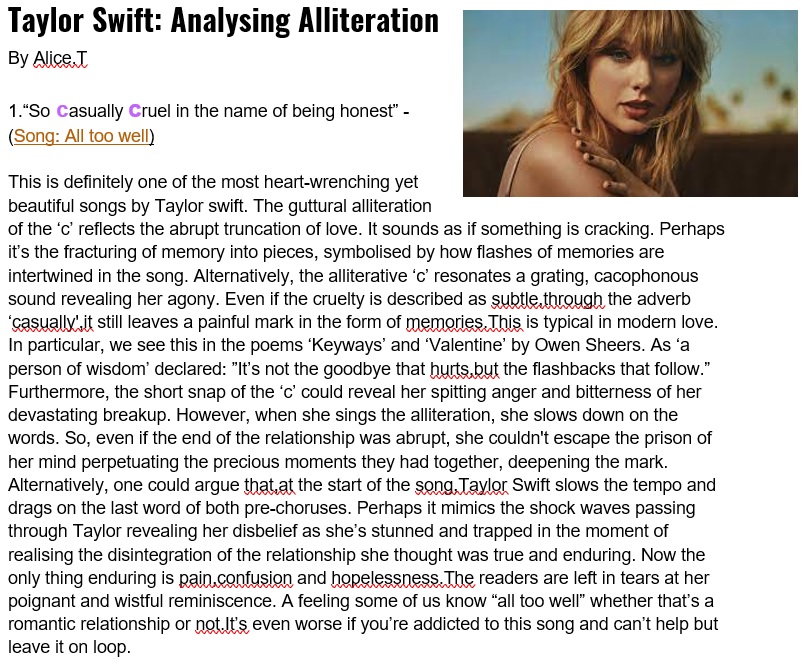
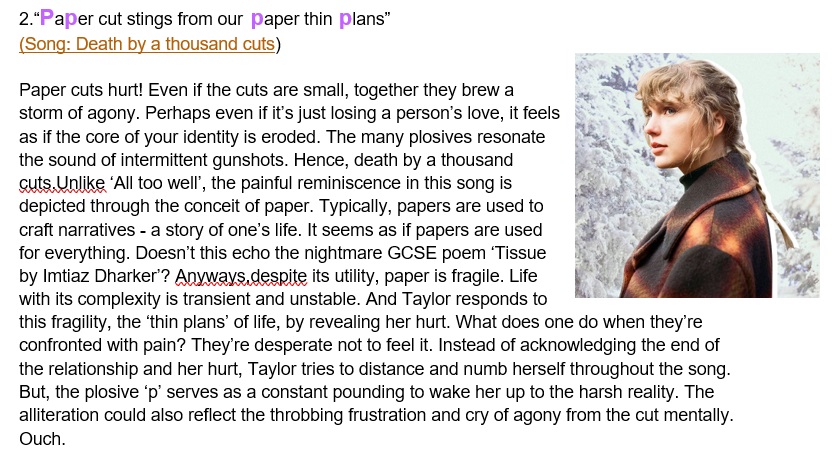
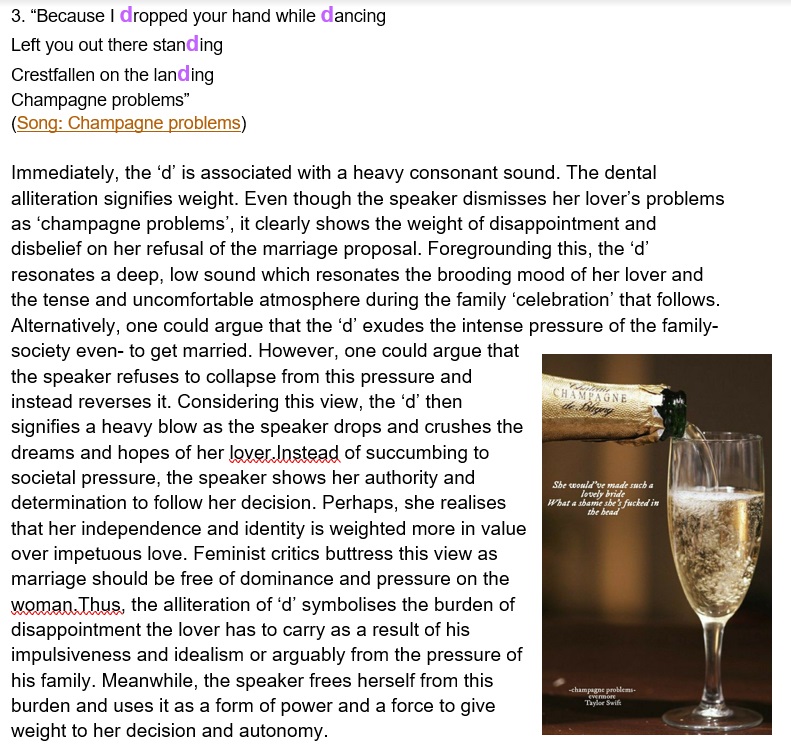
Send your own thoughts/analysis here.
Now check out our Wormholes classes/podcasts with Holding Absence and YONAKA.

